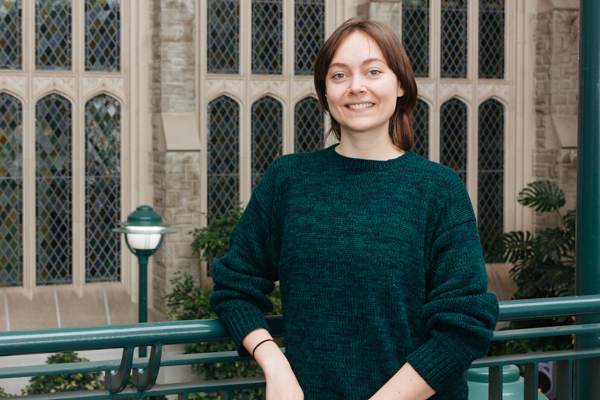Admissions
Equity, Diversity, Inclusion and Decolonization
The School of Graduate and Postdoctoral Studies is committed to equity, diversity, inclusion and decolonization in all aspects of graduate and postdoctoral studies. For more information regarding these commitments please visit grad.uwo.ca/edi-d.
Epidemiology and Biostatistics
Master of Science (MSc)Meet Pascale Nevins, MSc candidate in Epidemiology and Biostatistics

Why did you come to Western for your graduate degree?
An undergraduate supervisor recommended I look into the program at Western as a possibility—she completed her PhD in Biostatistics at Western, and only had good things to say. I also knew Western had a strong focus and well-known faculty in the fields of social and psychiatric epidemiology on the epidemiology side, and in the analysis of clustered data on the biostatistics side (both of which are very interesting to me). Plus, the graduate program and its community were very welcoming, right from the start.
Describe your research.
I’m exploring new ways of performing quantitative analyses of text data. Lots of text data is produced in health research (e.g., physician notes, interview or focus groups transcripts, etc.) and, using distributional properties of language, I want to provide meaningful descriptive variables and methods of comparing them that health researchers can use to present or analyze their text data. This will involve a combination of quantitative linguistics (which studies the statistical properties and probability distributions of elements of language), and natural language processing (a subcategory of machine learning used to process large volumes of text). This project is interdisciplinary and ever-evolving.
Where’s your favourite place on campus to work?
I love the wide, open windows on the third floor of the Western Centre for Public Health & Family Medicine (where the EpiBio program lives). The bright natural light is nice while I work, plus there are always people from the program around that I can say “hi” to. I also appreciate having the student kitchen (and my coffee and tea supply) right around the corner.
What suggestion would you like to share?
Say “yes!” to every opportunity you can. I think doing a Master’s is a great way of exploring your field and gaining experience. Your research here may not be the same as what you hope to do in the future (and it’s 100% fine if you don’t know what that is yet), but no matter what, it’ll open your eyes and you will learn something valuable.
Program Websites
Program Contact
Sarah Guerrero (epibio@uwo.ca)Academic Programs Coordinator
Department of Epidemiology and Biostatistics
Schulich Medicine & DentistryWestern University
Western Centre for Public Health and Family Medicine, 3rd Floor
1465 Richmond Street
London, Ontario N6G 2M1
t. 519-661-2162
We offer MSc and PhD degrees in Epidemiology and Biostatistics. Students are exposed to a full breadth of policy-relevant methodologies from the fields of epidemiology, biostatistics, health services research, health economics, genetic epidemiology, and program evaluation.
Program Length
- 6 Terms (Full-time study)
Program Design
- Full-time study or part-time study
- Thesis-based
Funding Information
Applicants are encouraged to apply for the following scholarships (if eligible):
Tuition and Fees
Tuition and fee schedules (per term) are posted on the Office of the Registrar's website at http://www.registrar.uwo.ca/student_finances/fees_refunds/fee_schedules.html
Graduate Student Affordability Calculator
Use this helpful tool to estimate how much money you will need to pay for your tuition, fees, housing, food, and other necessities for a 12-month (three term) academic year.
Admission Requirements
- 4-year honours degree (or equivalent)
- A min. average of A- (80% or 10/12) in the last 2 full-time years of education. Averages for part-time students will use the last 10.0 full credits (or equivalent).
- Strong performance in a recent statistics course. (Our graduate program requires students to have taken a recent course in statistics. If a great deal of time has elapsed since your last statistical course, we recommend that your application include concrete examples of how you use statistical methods in your regular role at work.)
English Language Proficiency
Applicants whose first language is not English must furnish evidence of their proficiency in the use of the English language:
- The Test of English as a Foreign Language (TOEFL). The competitive score is 100 for the iBT with no individual score below 25; or 580 for the paper and pencil version. [Western's TOEFL ID is 0984].
- The International English Language Testing Service (IELTS Academic). The competitive score is 7 out of 9 overall, with no individual score below 6.5.
- The Duolingo English Test. Applicants must attain a minimum score of 135.
- The Canadian Academic English Language Assessment (CAEL Assessment). The competitive overall score is 70, with 70 in both writing and speaking.
- Western English Language Centre. The requirement is successful completion of the High-Advanced level.
- Fanshawe College’s ESL Program. The requirement is graduation from Level 10, English for Academic Purposes, with a minimum 80% in all components.
Application Deadline
- October 15 - Applications open.
- January 15 - Applications deadline.
Fields of Research
- Biostatistics
- Epidemiology






